With the number of philanthropists and philanthropic foundations in the area always on the increase, the annual task of compiling a list of 50 gets harder and more subjective. This year’s list focuses on philanthropy’s response to the COVID-19 crisis. How could it be otherwise? The country’s philanthropic sector, the biggest in the world, leapt into action. Foundations and non-profits adapted quickly to frightening new realities, showing themselves to be nimble, confident, proactive. As the Los Angeles Times put it, “Charity is off the charts.”
Not so an incoherent, posturing Trump presidency, which for weeks pushed back against mounting evidence, and the advice of health specialists and intelligence agencies, and gambled with the lives of its citizens.
In late May, however, things got much worse for the nation – and for Trump – when an unarmed black man, George Floyd, was killed in police custody in Minneapolis. Within hours, the angry protests that erupted in cities across the country (and across the globe) demanding a racial reckoning were the largest, and in some cities the most destructive and violent, since the upheaval following Martin Luther King’s assassination in 1968.
The black community was already disproportionately affected by the coronavirus pandemic, particularly in crowded urban areas, and anger over Floyd’s killing quickly burgeoned into a mass protest against the societal, cultural and economic grievances of black Americans.
Non-profits and philanthropic organizations in Washington regularly address these issues and were already doing so in the context of the COVID-19 pandemic. For example, the Greater Washington Community Foundation, a philanthropic facilitator for other charities in the area had set up a COVID-19 Emergency Response Fund. In 10 weeks, the fund attracted $7 million from foundations and individual givers. By mid-May, the foundation had received 740 requests for grants, and had paid out $4 million to 96 organizations.
“Philanthropy now faces a confluence of multiple crises at once: public health, economic, political, and cultural, and all with racial inequity as an underlying condition,” says Tonia Wellons, president of the Greater Washington Community Foundation.
The pandemic had widened the gap between the haves and have-nots. Thousands followed instructions and stayed home – but not the homeless. For distraction, those at home baked banana bread; but not those who couldn’t even afford to buy bananas. With schools closed there was home schooling, but not in neighborhoods without Wi-Fi. Telemedicine became widely available – to households with computers.
But the challenge of feeding hundreds of thousands of unemployed, of school kids and of other groups in need became logistically more complicated when relief workers had to contend with curfews, police barriers and surging crowds of demonstrators. And as two crisis situations requiring diametrically opposite actions – staying home and close human contact in public demonstrations – clashed, the danger of a second surge of COVID-19 cases raised alarm among experts. Governor Andrew Cuomo of New York said the demonstrations could become “super spreaders” of the coronavirus.
On the plus side, well before George Floyd’s death, the virus had also shown how far Americans will go to help one another. “If we don’t have a big explosion of empathy in this country or around the world now, I don’t know when we will,” says chef José Andrés, tireless supplier of food to the hungry. “All of a sudden we’re gonna be respectful to everyday Americans, because those everyday Americans are the heroes that kept America going.”
Countries with women leaders – New Zealand, Germany – did better at fighting the coronavirus than where the leadership was male. In the same vein perhaps, this year’s Philanthropy 50 includes a record number of women philanthropists in their own right – by no means gender parity in super-wealth. But still a sea change of sorts.
JOSÉ ANDRÉS and PATRICIA FERNANDEZ DE LA CRUZ
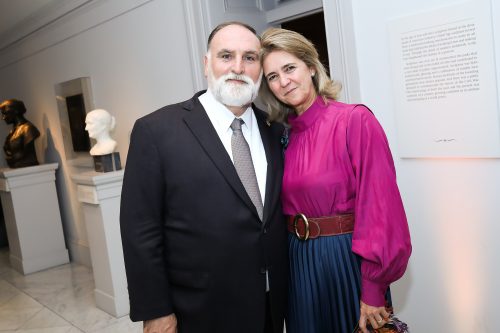
In a country incapable of feeding all of its citizens, an army of restaurant professionals across America has been filling a very large gap, preparing meals on a mass scale for the men, women and children who would otherwise be going hungry amid the pandemic. Leading the charge is José Andrés, celebrity chef and humanitarian, who has temporarily closed most of his high-end restaurants (except for takeout) to focus on his disaster relief organization, World Central Kitchen. Having served communities ravaged by disasters and hurricanes it has stepped in to provide millions of free meals daily in beleaguered New York and to offer logistical support to similar volunteer organizations. Andrés was also on hand to distribute meals at Maryland’s Camden Yards Sports Complex and has teamed up with the Washington Nationals to convert their baseball stadium into a giant community kitchen serving the nation’s capital. He is also leading a campaign to raise the level of federal funds help to the restaurant industry.“Restaurants in America are the DNA of a functioning America,” he recently told Anderson Cooper in a 60 Minutes interview. “We’ll not be an America as we know it if those restaurants don’t come back to be part of the American way of life … Every dollar that goes into a restaurant when you dine out, trickles down across the economy in a way that no other business does.”
ADRIENNE ARSHT
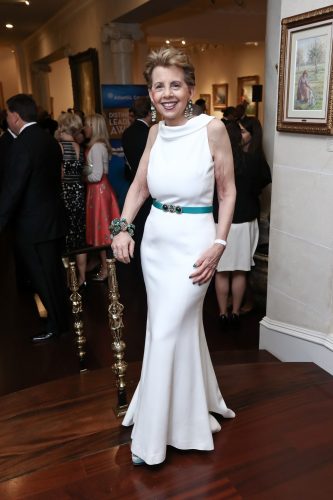
Since the pandemic Adrienne Arsht has concentrated her giving on the art world where, she says, “unemployment is total. In the field of performing, with the theaters, arenas and concert halls closed, it’s staggering. I’m getting requests to donate to their out-of-work staff.” The dire need extends beyond performers themselves to the whole range of entertainment industry employees from make-up artists and stagehands to box office staff. According to Arsht, Lincoln Center for the Performing Arts, the Kennedy Center and the Adrienne Arsht Center for the Performing Arts in Miami, are among the institutions that have started funds for their furloughed or laid off workers. But COVID-19 has not spared the visual arts either. “The Met [Metropolitan Museum of Art] is writing to everybody,” Arsht says—“everybody” being moneyed patrons such as herself. She is a trustee of the Kennedy Center (where she gave $5 million for its recently opened The Reach extension) and Lincoln Center, where the stage at Alice Tully Hall bears her name in recognition of a $10 million contribution to its modernization. She put up $30 million to match a Rockefeller Foundation grant to the Atlantic Council, a leading Washington think tank, to create a Resilience Center, now in full operation, focusing on the development of skills to deal with hardship and bounce back from adversity. Arsht says her current challenge is self-distancing herself from her refrigerator, but she has clearly been doing a lot of thinking on the present crisis as well. She thinks the aftermath will require a different approach, and philanthropy should be ready to play a significant role in building “a future, based on what we learn.” That includes a significant improvement in air quality, an unintended consequence of the pandemic that has strengthened the climate change argument in favor of more action. “The existence of before and after pictures has really made the predictions about climate change quantifiable, and not just theories,” thus undermining the arguments of skeptics and non-believers. Arsht predicts a renascence of the arts in which the trauma of COVID-19 will be re-lived and scrutinized in novels, plays, movies, and even opera. “Instead of ‘Cosi Fan Tutte’ we’ll have ‘Covid Fan Tutte,’” she jokes, adding that philanthropists need to step up support for medical research in the United States to ensure that a repetition of the disastrous crisis becomes very remote. “A lot of money needs to be put into research for a new way to determine the DNA of a new virus a lot quicker than is currently possible.”
PATRICIA BAUMAN
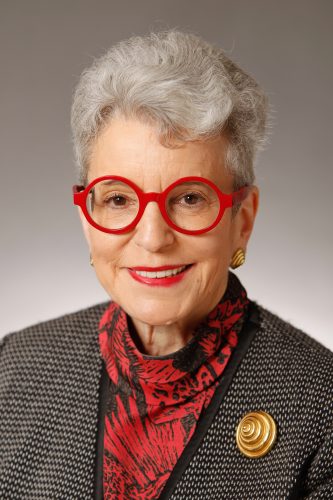
The Bauman Foundation was started by New York businessman Lionel Bauman, and its president is now Washington resident Patricia Bauman. The foundation gives $6 million a year to causes reflecting its declared mission to preserve “the values of a true democratic society.” Some help translates as support for left-of-center causes, including climate change, environmental health, right to know, health care and the arts. Before taking over management of her late father’s foundation, Patricia Bauman was chair of the Democratic Alliance. As for specific recipients of Bauman Foundation gifts, let’s say Trump need not stand on tippty-toes waiting for any funds from Bauman. The long list of the foundation’s regular causes includes the Urban Institute, the Center for Democratic Progress, the Natural Resources Defense Council, and the Clean Water Fund.
JEFF BEZOS

An avalanche of billionaires’ money directed at the COVID-19 crisis has doubtless had a positive impact, but for people who believe that the super-rich have a moral obligation to be super-generous (which they do not) it’s never going to be enough. Not surprisingly, the richest man in the world ($138.5 billion, according to Fortune magazine) has been a prime target. On April 2, Bezos announced that he was contributing $100 million to Feeding America, the largest hunger relief non-profit, even as Amazon was fending off a strike by its warehouse workers in New York about inadequate protection from the pandemic and other grievances. Amazon has made other contributions to U.S. and European relief organizations of about $72 million. But some have criticized Bezos’ philanthropy and that of his organization as too little. The $100 million to Feeding America amounts to an estimated 11 days of what Bezos earns. Many businesses have been brought to the edge of ruin by COVID-19, but Amazon.com has had to hire more staff to cope with the increased demand for online shopping. On a broader level, the large-scale support of high-tech major donors and foundations such as Bezos, the Gates Foundation and Facebook’s Mark Zuckerberg has raised questions about an elected government unable to meet all its social responsibilities and opening the way for unelected individuals and organizations with agendas of their own to step in. The
COVID-19 crisis will end sooner or later, but this debate is only just beginning.
JERE and BONNIE BROH-KAHN
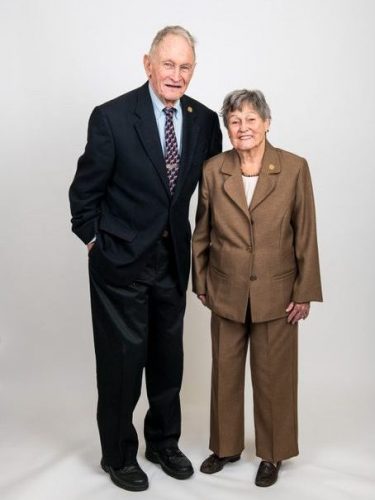
The two former foreign service officers made a $12 million commitment to the Smithsonian Institution to support education programs in some of its key establishments. Eight million dollars endows new positions of Broh-Kahn director of education at the Museum of Natural History and the National Air and Space Museum respectively. A further $2 million supports education programs at the National Museum of American History and the Museum of the American Indian. The Broh-Kahns, Bethesda residents, have been supporters of the Smithsonian for a number of years, but this is by far their largest gift. “We want knowledge to be diffused to the younger generation because they are going to have a tough time with climate change and global warming and other problems,” Jere Broh-Kahn says. “They need as much knowledge as they can obtain to make the right decisions.” In recent years, the couple have also contributed to the National Gallery of Art, Arena Stage and the Academy of Classical Acting at George Washington University.
EDDIE C. and C. SYLVIA BROWN
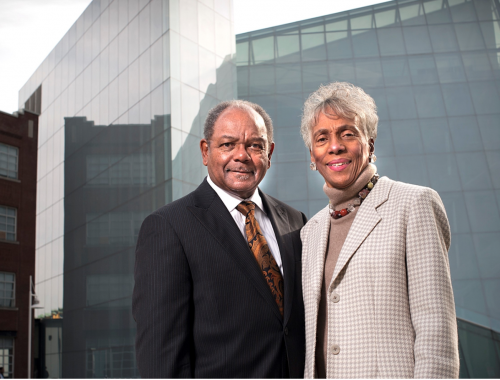
The Browns’ family foundation has been active in Baltimore philanthropy with special attention to the African American community for many years. The founder and CEO of the investment firm Brown Capital Management and his wife tend to focus on the areas of health, the arts and education. For example, in 2007, the foundation started a Community Health Scholarship program for African American students at the Johns Hopkins Bloomberg School of Public Health, providing five-year full Ph.D. funding. The Browns have long been supporters of Baltimore’s art scene, and in 2019 gifted $3.5 million to the Baltimore Museum of Art to appoint a chief curator. Their contributions to music include support of Orchkids, a program started in elementary schools by the conductor Marin Alsop aimed at teaching kids to play musical instruments.
MARY CATHERINE BUNTING

Baltimore’s Mercy Medical Center is fast tracking construction of a new 32-bed in-patient care extension to its Mary Catherine Bunting Center to treat COVID-19 patients. That would be former Sister Mary Catherine Bunting, a major contributor to the cost of the hospital’s $400 million, 20-story tower that bears her name at Mercy Medical Center. A one-time Sister of Mercy, she left the order, but remained a nurse at the hospital until retirement. She is known for her philanthropic work throughout Baltimore City: the Johns Hopkins University, the Bloomberg School of Public Health, the Chesapeake Bay Foundation and Catholic Relief Services have all received gifts. Education is one of her main philanthropic interests, with donations to the Maryland Science Center ($1.5 million), and the Sisters Academy of Baltimore ($1 million). In September, she donated $2 million to the oldest Catholic girls school in Baltimore, the prestigious but financially ailing Institute of Notre Dame, incidentally, Speaker of the House Nancy Pelosi’s alma mater. But six months later, the school announced it was closing because of financial difficulties and poor enrollment. How does a former nun who would have taken the vow of poverty on joining the order have such sums to give away? Sister Mary Catherine is one of the heirs of the Noxzema Chemical Company started by her grandfather, George Avery Bunting.
BUFFY CAFRITZ

A leading philanthropist and social presence in the nation’s capital, Buffy Cafritz is among the trustees of the Kennedy Center who have contributed to the support fund for its laid off or furloughed staff. On March 4, she helped fund the Library of Congress Gershwin Prize for Popular Song concert honoring Garth Brooks, one of the last public events in the District before the pandemic clampdown, and hosted a dinner for the honoree the night before the performance. Cafritz has been a member of the James Madison Council, the main support group for the Library since 1991. In other respects, she says, the coronavirus crisis has had little impact on her philanthropy. “I plan to hold the course and possibly increase my giving to the institutions I support.” The Buffy and William Cafritz Family Foundation, founded in 2006, has long supported the medical and health research sector; she is a board member of the Foundation for the National Institutes of Health and a contributor to the Washington Ballet, the National Gallery of Art and many other causes.
CALVIN and JANE CAFRITZ
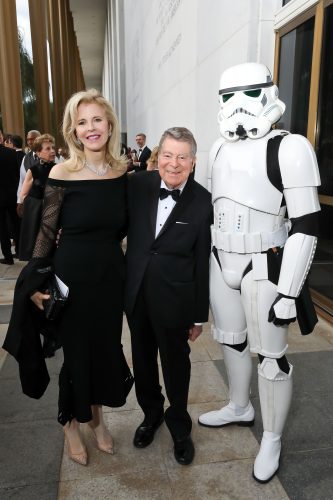
In the first quarter of 2020, The Morris and Gwendolyn Cafritz Foundation, one of the oldest in Washington and now run by son Calvin and wife Jane, contributed $6,225,000 to non-profits and charities in the District. One million dollars went to the COVID-19 Emergency Response Fund set up by the Greater Washington Community Foundation, an organization acting as a facilitator for philanthropies in the area. In 2019, the Cafritz Foundation had made a total of $23 million contributions to 428 charitable organizations in D.C., following its established pattern of giving in recent years. But the need to confront the coronavirus pandemic has changed the narrative of charitable giving, says Mardell Moffett, executive director of the Cafritz Foundation. “We give general support grants (to charities), and flexibility is especially important now as many groups have needed to shift away from their original plans.” Hence the Cafritz gift to the Greater Washington Community Foundation in response to emerging new priorities. “All of a sudden, telemedicine represented a big shift in how health organizations deliver their service, which means access to the internet and providing emergency help for people to move online,” Moffett says. With schools closed, well-equipped classes were of little use, but tools for home schooling were in great demand. The arts sphere needed help in shifting from live to virtual performances. At the same time, the Foundation’s mainstream giving included $1 million to Sibley Memorial Hospital towards its Proton Center, proton therapy being a state-of-the-art treatment of cancer, $650,000 to the Round House Theatre, $600,000 to Education Forward, and $580,000 to the Folger Shakespeare Library. But the ill wind of COVID-19 has raised questions about the shape of philanthropy in the post-pandemic world, says Moffett. “What do foundations and donors need to do differently to support the non-profit organizations? How can we help build resiliency?” she says. And then there’s the Cafritz Young Artists, formerly the Domingo-Cafritz Young Artists but recently bereft of one of its founding parents, super tenor Placido Domingo, for reasons only those living on another planet don’t know. The driving force behind this pool of young operatic talent is, of course, Jane Cafritz. With the Washington National Opera calendar cancelled, the singers have been pouring out online material for the opera’s internet content. In other respects, says Cafritz Young Artists program director Robert Ainsley, aspiring singers and staff have shown remarkable resilience in carrying on with their training remotely, including voice training and regular lessons in Verdean Italian and Wagnerian German. The current group graduated in May. “Undeniably, there will be long term repercussions after this time of crisis, and it will be months or even years before the financial health of our institutions returns to what it was,” Ainsley predicts. “The preparation and training that programs like ours provide are more valuable than ever.”
STEVE and JEAN CASE
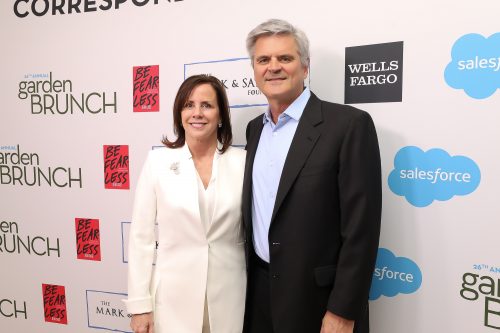 As the co-founder of AOL in the 1990s, Steve Case is one of the pioneers of the Internet, and as such a historical figure in the history of hi-tech development. Today, he and his wife Jean are an influential power couple in the world of philanthropy with their Case Foundation and Revolution LLC, the investment firm with a difference he founded in 2005. Jean is CEO of the couple’s foundation and also chairs the National Geographic Society. Basically, the Cases want to change the world. Jean is a pioneer in “impact investing” an approach to investing that seeks both a financial and social return on all investments, supporting visionary entrepreneurs with business projects that promise to have an impact on society. And Steve leads one of the area’s VC firms, Revolution where part of the strategy is “Rise of the Rest,” a program that offers seed money to business start-ups across the U.S. outside the traditional mainstream business areas of New York and California. For “Rise of the Rest” Steve Case leads bus tours to cities and towns in Middle America and underwrites business projects by local entrepreneurs.
As the co-founder of AOL in the 1990s, Steve Case is one of the pioneers of the Internet, and as such a historical figure in the history of hi-tech development. Today, he and his wife Jean are an influential power couple in the world of philanthropy with their Case Foundation and Revolution LLC, the investment firm with a difference he founded in 2005. Jean is CEO of the couple’s foundation and also chairs the National Geographic Society. Basically, the Cases want to change the world. Jean is a pioneer in “impact investing” an approach to investing that seeks both a financial and social return on all investments, supporting visionary entrepreneurs with business projects that promise to have an impact on society. And Steve leads one of the area’s VC firms, Revolution where part of the strategy is “Rise of the Rest,” a program that offers seed money to business start-ups across the U.S. outside the traditional mainstream business areas of New York and California. For “Rise of the Rest” Steve Case leads bus tours to cities and towns in Middle America and underwrites business projects by local entrepreneurs.
COURTNEY CLARK PASTRICK and SCOTT PASTRICK
 Clark Pastrick is chair of the foundation named after her parents, A. James Clark and Alice B. Clark. The late Alfred James Clark built and ran one of the largest construction companies not just in the Washington, D.C. area but across the eastern United States. Daughter Courtney has built on her parents’ already extensive philanthropy, particularly relating to education and health. She is an honorary chair of the University of Maryland’s “Fearless Ideas: The Campaign for Maryland,” a mammoth fund drive with a $1.5 billion target. The foundation has separately donated $219.5 million to the university’s Clark School of Engineering (an earlier Clark bequest) for what is officially described as “an array of need-based scholarships, graduate fellowships, distinguished faculty chairs, and operational and capital projects.” Clark Pastrick has also gifted $15 million to Vanderbilt University for fellowships and made contributions to DC-CAP, a college access program and Sibley Memorial Hospital, among others.
Clark Pastrick is chair of the foundation named after her parents, A. James Clark and Alice B. Clark. The late Alfred James Clark built and ran one of the largest construction companies not just in the Washington, D.C. area but across the eastern United States. Daughter Courtney has built on her parents’ already extensive philanthropy, particularly relating to education and health. She is an honorary chair of the University of Maryland’s “Fearless Ideas: The Campaign for Maryland,” a mammoth fund drive with a $1.5 billion target. The foundation has separately donated $219.5 million to the university’s Clark School of Engineering (an earlier Clark bequest) for what is officially described as “an array of need-based scholarships, graduate fellowships, distinguished faculty chairs, and operational and capital projects.” Clark Pastrick has also gifted $15 million to Vanderbilt University for fellowships and made contributions to DC-CAP, a college access program and Sibley Memorial Hospital, among others.
WILLIAM and JOANNE CONWAY
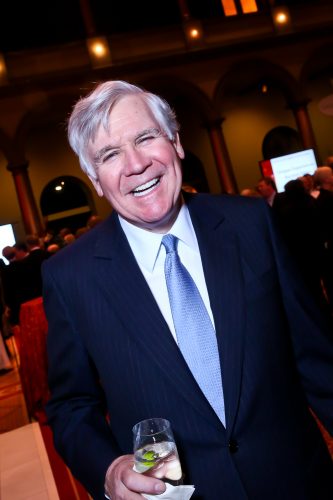
The current pandemic has raised to unprecedented levels both the need and importance of health care professionals and the Conways are doing something about it. Through their Bedford Falls Foundation they have long been major contributors to the training of nurses in the greater Washington area. Their gift of $20 million in March to Catholic University to support the new nursing and science building was the most recent. “Given everything that is going on in the world—especially with the COVID-19 pandemic—we will need as many well trained, compassionate healthcare professionals as we can get,” says William (Bill) Conway. He is one of the founding triumvirate (with David Rubenstein and Daniel D’Aniello) of the Carlyle Group private equity firm. Earlier, through their Bedford Falls Foundation, the Conways gave $40 million to underwrite the
creation of the Conway School of Nursing, making the couple Catholic University’s biggest benefactor. They also support the PBS, “Newshour,” the University of Virginia School of Nursing, Johns Hopkins University, and various Catholic charities. A decade ago, Conway famously pledged $1 billion to help low income people get the needed education and training to find jobs.
DANIEL and GAYLE D’ANIELLO
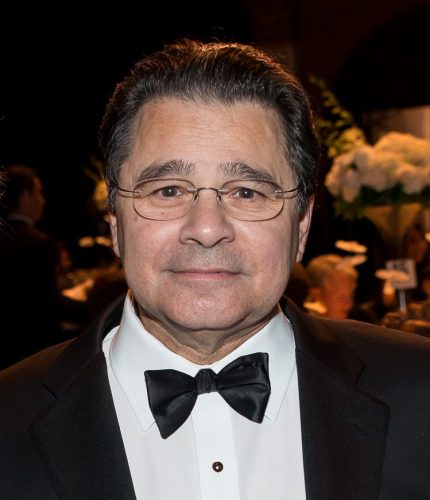 D’Aniello is another of the three billionaire founders of the private equity firm Carlyle Group, and is now a chairman emeritus. The D’Aniellos’ Orange Crimson Foundation, which he started with his wife, bases its philanthropy on what he calls the “five pillars”—faith-based (mostly Catholic) giving, educational programs, free enterprise, the performing arts and mental health research. He is chairman of the Wolf Trap Foundation for the Arts, has contributed $20 million to create the National Veterans Resource Center at Syracuse University and a further $20 million to the American Enterprise Institute to underwrite the conservative think tank that has supplied several aides and advisers to the Trump White House when AEI moved into new D.C. headquarters.
D’Aniello is another of the three billionaire founders of the private equity firm Carlyle Group, and is now a chairman emeritus. The D’Aniellos’ Orange Crimson Foundation, which he started with his wife, bases its philanthropy on what he calls the “five pillars”—faith-based (mostly Catholic) giving, educational programs, free enterprise, the performing arts and mental health research. He is chairman of the Wolf Trap Foundation for the Arts, has contributed $20 million to create the National Veterans Resource Center at Syracuse University and a further $20 million to the American Enterprise Institute to underwrite the conservative think tank that has supplied several aides and advisers to the Trump White House when AEI moved into new D.C. headquarters.
JACK DAVIES and KAY KENDALL
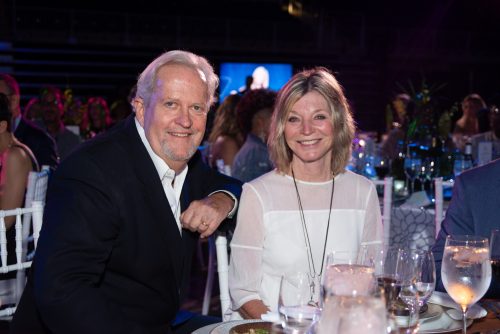 This Kalorama couple is involved in a broad range of philanthropies. Kay Kendall, who chairs the D.C. Commission on the Arts and Humanities, also works with THEARC (Town Hall Education Arts Recreation Campus) in Anacostia, and Restoration Stage, and has acted as host at a number of charity events for CityDance (where she serves as Chair of the Board of Directors) and most recently the Children’s Ball 2020, which, however, was canceled because of the COVID-19 shutdown. Jack Davies is a partner in Monumental Sports & Entertainment (see entry for Ted Leonsis), and is on the board of directors of Venture Philanthropy Partners, an umbrella organization that focuses on educating children from less affluent Washington neighborhoods.
This Kalorama couple is involved in a broad range of philanthropies. Kay Kendall, who chairs the D.C. Commission on the Arts and Humanities, also works with THEARC (Town Hall Education Arts Recreation Campus) in Anacostia, and Restoration Stage, and has acted as host at a number of charity events for CityDance (where she serves as Chair of the Board of Directors) and most recently the Children’s Ball 2020, which, however, was canceled because of the COVID-19 shutdown. Jack Davies is a partner in Monumental Sports & Entertainment (see entry for Ted Leonsis), and is on the board of directors of Venture Philanthropy Partners, an umbrella organization that focuses on educating children from less affluent Washington neighborhoods.
CHRIS and JILL DAVIS
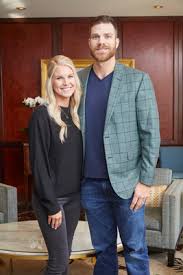 Major League Baseball All-star Davis and his wife, Jill, a former nurse, already had a reputation in Baltimore as generous givers to a range of causes when the couple gave $3 million to the University of Maryland Children’s Hospital for a state-of-the-art pediatric hybrid catheterization and operating room to be named after their daughter Evie, who was born with a ventricular septal defect in 2018. Their gift is the largest philanthropic donation from a Baltimore sports figure to the University of Maryland Medical Center. Since then, the couple have served as ambassadors of the UM Children’s Hospital helping to raise awareness of childhood illnesses. Earlier attention-grabbing philanthropic contributions by the Orioles first basemen was his pledge to the International Justice Mission, the anti-slavery organization, of $1,000 for every run he scored in the 2018 season.
Major League Baseball All-star Davis and his wife, Jill, a former nurse, already had a reputation in Baltimore as generous givers to a range of causes when the couple gave $3 million to the University of Maryland Children’s Hospital for a state-of-the-art pediatric hybrid catheterization and operating room to be named after their daughter Evie, who was born with a ventricular septal defect in 2018. Their gift is the largest philanthropic donation from a Baltimore sports figure to the University of Maryland Medical Center. Since then, the couple have served as ambassadors of the UM Children’s Hospital helping to raise awareness of childhood illnesses. Earlier attention-grabbing philanthropic contributions by the Orioles first basemen was his pledge to the International Justice Mission, the anti-slavery organization, of $1,000 for every run he scored in the 2018 season.
RAUL and JEAN-MARIE FERNANDEZ
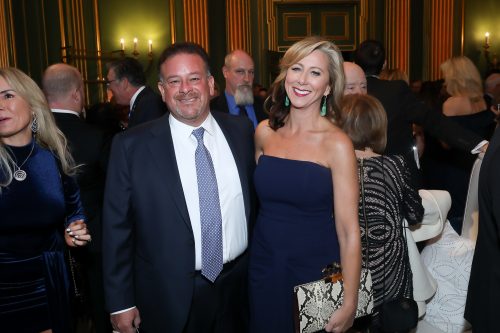 Local technology executive Raul Fernandez was co-founder of Venture Philanthropy Partners, which supports nonprofit organizations in the Washington area with funding and management assistance on how to use it effectively. VPP’s main focus is the education of children in low-income communities. In addition, he serves as vice-chairman of Monumental Sports & Entertainment (see Ted Leonsis, below). He was also four-time chairman of the popular Fight Night, the main benefit gala for Fight for Children, which funds youth programs. Fight Night held its last benefit in 2019 after 30 years, during which it raised $65 million. The couple make philanthropic donations through their Fernandez Foundation. Jean-Marie Fernandez is chair of the Washington Ballet, and but for COVID-19 would have hosted the Children’s Ball 2020.
Local technology executive Raul Fernandez was co-founder of Venture Philanthropy Partners, which supports nonprofit organizations in the Washington area with funding and management assistance on how to use it effectively. VPP’s main focus is the education of children in low-income communities. In addition, he serves as vice-chairman of Monumental Sports & Entertainment (see Ted Leonsis, below). He was also four-time chairman of the popular Fight Night, the main benefit gala for Fight for Children, which funds youth programs. Fight Night held its last benefit in 2019 after 30 years, during which it raised $65 million. The couple make philanthropic donations through their Fernandez Foundation. Jean-Marie Fernandez is chair of the Washington Ballet, and but for COVID-19 would have hosted the Children’s Ball 2020.
ANDY and HEATHER FLORANCE
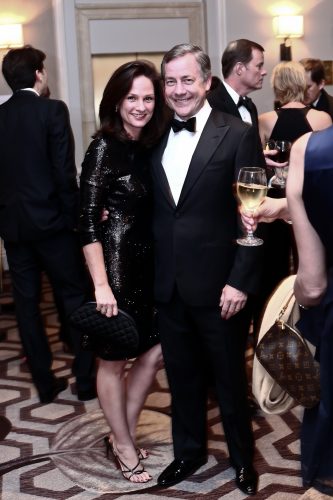 In 2016, the Florances took the lead in turning the concrete roof of Children’s National Hospital into the Bunny Mellon
In 2016, the Florances took the lead in turning the concrete roof of Children’s National Hospital into the Bunny Mellon
Healing Garden. A gift from the estate of the late philanthropist and horticulturist went a good way towards financing the project, but the Florances and the staff of Andy’s CoStar Group raised further funds and oversaw the garden’s conception and construction. In 2019, they partnered with Virginia Cretella Mars (see below) to underwrite the restoration of a building adjacent to Washington National Cathedral into a center for conferences and study, with Mars and her four daughters gifting $17 million and Andy and Heather Florance $5 million. Andy Florance is chairman of the Cathedral’s board of trustees.
MICHELLE DiFEBO FREEMAN
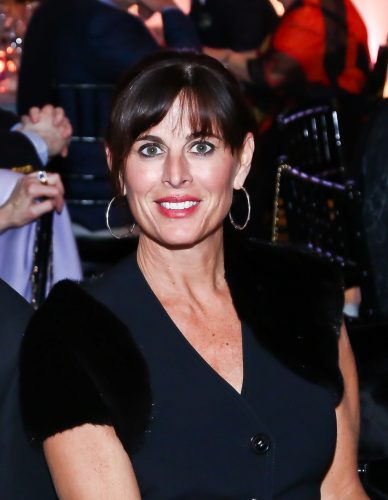
Each year, Freeman spends one night sleeping in the open to underscore the plight of homeless children. The sleep-out is organized by Covenant House, the network of dormitories for homeless youth that the real estate investor supports through her two philanthropic organizations, the Carl M. Freeman Foundation and the Joshua M. Freeman Foundation, the latter set up in memory of her late husband. Freeman is a partner of Monumental Sports & Entertainment and Covenant House is typical of her foundations’ innovative community-based giving. Earlier this year she contributed $250,000 to a health care group in Delaware for COVID-19 testing and protective equipment.
ALLAN and SHELLY HOLT
 The Holts channel most of their philanthropy through their Hillside Foundation, primarily funding Jewish causes. Their gift of $20 million to the U.S. Holocaust Memorial Museum in 2016 to update its main exhibition hall was one of the biggest the institution has received. Allan Holt, a managing director of the Carlyle Group investment company, is the Memorial Council’s vice-chairman. In 2019, the couple contributed $11 million for a new gallery as part of the National Air and Space Museum’s current renovation project. More recent recipients of Hillside Foundation support include the Defiant Requiem Foundation (aiding victims of the Terezín concentration camp near Prague) and Friends of the Israel Defense Forces.
The Holts channel most of their philanthropy through their Hillside Foundation, primarily funding Jewish causes. Their gift of $20 million to the U.S. Holocaust Memorial Museum in 2016 to update its main exhibition hall was one of the biggest the institution has received. Allan Holt, a managing director of the Carlyle Group investment company, is the Memorial Council’s vice-chairman. In 2019, the couple contributed $11 million for a new gallery as part of the National Air and Space Museum’s current renovation project. More recent recipients of Hillside Foundation support include the Defiant Requiem Foundation (aiding victims of the Terezín concentration camp near Prague) and Friends of the Israel Defense Forces.
LAURENE POWELL JOBS
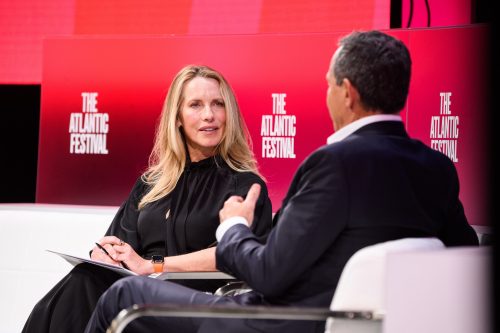
A controlling interest in the magazine Atlantic monthly, plus partnership in the Monumental Sports and Entertainment group (see Ted Leonsis) are reason enough to include Jobs as a Washington philanthropist. Her significant stake in Monumental, said to be 20 percent, is second only to that of managing partner Ted Leonsis. The widow of Apple’s co-founder Steve Jobs has channeled her considerable net worth ($20 billion) into the Emerson Collective, an umbrella organization for her business and philanthropic interests, the latter ranging from education to immigration, and from personal health to the environment—based on her belief that they are all interconnected. “When you’re working in the social sector, you actually cannot make any lasting forward movement if you’re only focused on one thing,” she told the New York Times in a rare interview earlier this year. “I came through the education door … and, of course, that was connected to immigration and health and well-being and clean air, water and soil, and access to opportunity.” With the outbreak of the coronavirus pandemic, Emerson has teamed with Apple and the Ford Foundation to contribute $12 million, with more to come, to World Central Kitchen and Feeding America to help people who, according to the Apple announcement, “face great barriers to receiving safe and consistent access to meals.”
SHEILA JOHNSON
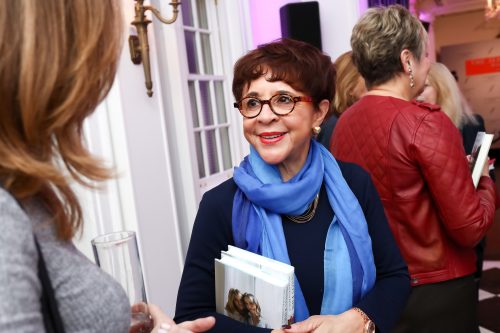 “Once you have a successful business you want to learn to give back, so I find things that I’m really passionate about. … I wish I had enough to be able to reach out to everyone, to be able to take them under my wing.” So said Sheila Johnson, founder and CEO of Salamander Hotels and Resorts and vice-chairman of Monumental Sports & Entertainment, of her philanthropic giving to cultural and humanitarian causes in a recent interview with the Wall Street Journal. In 2020, the 50th student that her fellowship program has so far put through Harvard University graduated from the Kennedy School. She is also the lead contributor in the $13 million new horse stables project in the National Mall for the mounted U.S. Park Police, with groundbreaking scheduled for the summer. For the past four years, she has headed—along with Sachiko Kuno, president and CEO of the S&R Foundation and the Sucampo Group – a $12 million financial support group for start-ups by women entrepreneurs, which they named WE Capital. “We watch their bottom line and watch them grow,” Johnson told the Journal. “At my age I can give them a lot of ammunition about how to move forward.” At Monumental, Johnson oversees the 2019 WNBA champion Washington Mystics.
“Once you have a successful business you want to learn to give back, so I find things that I’m really passionate about. … I wish I had enough to be able to reach out to everyone, to be able to take them under my wing.” So said Sheila Johnson, founder and CEO of Salamander Hotels and Resorts and vice-chairman of Monumental Sports & Entertainment, of her philanthropic giving to cultural and humanitarian causes in a recent interview with the Wall Street Journal. In 2020, the 50th student that her fellowship program has so far put through Harvard University graduated from the Kennedy School. She is also the lead contributor in the $13 million new horse stables project in the National Mall for the mounted U.S. Park Police, with groundbreaking scheduled for the summer. For the past four years, she has headed—along with Sachiko Kuno, president and CEO of the S&R Foundation and the Sucampo Group – a $12 million financial support group for start-ups by women entrepreneurs, which they named WE Capital. “We watch their bottom line and watch them grow,” Johnson told the Journal. “At my age I can give them a lot of ammunition about how to move forward.” At Monumental, Johnson oversees the 2019 WNBA champion Washington Mystics.
MICHAEL (MIKE) KLEIN
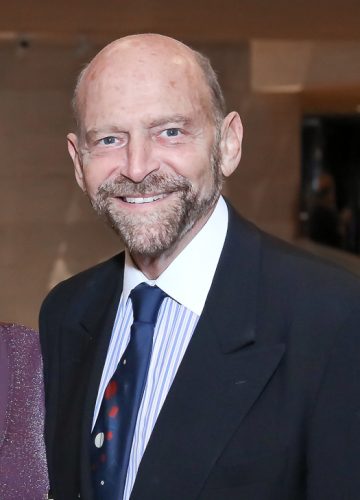 The former Wilmer, Cutler & Pickering partner and technology, construction and strategies consulting entrepreneur has been a mainstay of the Shakespeare Theatre Company for more than 20 years and played a key role in planning, financing and building its expansive Harman Center in downtown Washington. In March, when the pandemic closed everything for the foreseeable future, he doubled down on his longtime commitment with a challenge grant of $1 million to help shore up operations until the crisis passes. By early June, artistic director Simon Godwin announced that the $1 million target had been reached, and Klein was offering to match a new target of $2.5 million. To date, more than 70 percent has been pledged in response. Klein is also a supporter of the American Himalayan Foundation, PEN/Faulkner Foundation, the NAACP Legal Defense and Education Fund, Harvard University and the University of Miami.
The former Wilmer, Cutler & Pickering partner and technology, construction and strategies consulting entrepreneur has been a mainstay of the Shakespeare Theatre Company for more than 20 years and played a key role in planning, financing and building its expansive Harman Center in downtown Washington. In March, when the pandemic closed everything for the foreseeable future, he doubled down on his longtime commitment with a challenge grant of $1 million to help shore up operations until the crisis passes. By early June, artistic director Simon Godwin announced that the $1 million target had been reached, and Klein was offering to match a new target of $2.5 million. To date, more than 70 percent has been pledged in response. Klein is also a supporter of the American Himalayan Foundation, PEN/Faulkner Foundation, the NAACP Legal Defense and Education Fund, Harvard University and the University of Miami.
ROBERT and ARLENE KOGOD
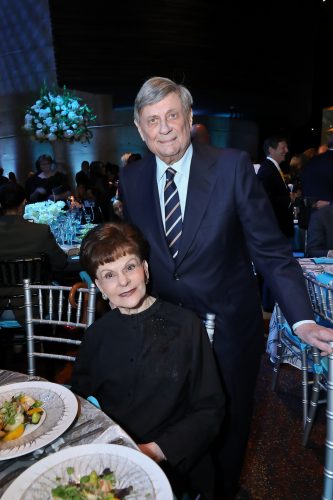 The Robert P. and Arlene R. Kogod Family Foundation also includes gifts in the name of Charles E. Smith, the Washington real estate tycoon whose daughter Kogod married. The Kogods’ philanthropy is directed at a broad landscape of charities, including Jewish causes, education, arts and culture. Robert Kogod is a member of the Board of Regents of the Smithsonian Institution, to which the family has given more than $25 million. For example, the Kogod foundation financed the elegant courtyard designed by Norman Foster linking the National Portrait Gallery and the Smithsonian American Art Museum. Kogod supports his alma mater, American University, home of the Kogod Business School. Among the foundation’s other grantees are Sidwell Friends School and Georgetown University. In recent years, the Kogods have given $12 million to the Hebrew Home of Greater Washington in memory of Charles Smith. The Kogods have also, at various times, supported the Shakespeare Theatre, Arena Stage and the Woolly Mammoth Theatre Company.
The Robert P. and Arlene R. Kogod Family Foundation also includes gifts in the name of Charles E. Smith, the Washington real estate tycoon whose daughter Kogod married. The Kogods’ philanthropy is directed at a broad landscape of charities, including Jewish causes, education, arts and culture. Robert Kogod is a member of the Board of Regents of the Smithsonian Institution, to which the family has given more than $25 million. For example, the Kogod foundation financed the elegant courtyard designed by Norman Foster linking the National Portrait Gallery and the Smithsonian American Art Museum. Kogod supports his alma mater, American University, home of the Kogod Business School. Among the foundation’s other grantees are Sidwell Friends School and Georgetown University. In recent years, the Kogods have given $12 million to the Hebrew Home of Greater Washington in memory of Charles Smith. The Kogods have also, at various times, supported the Shakespeare Theatre, Arena Stage and the Woolly Mammoth Theatre Company.
SACHIKO KUNO
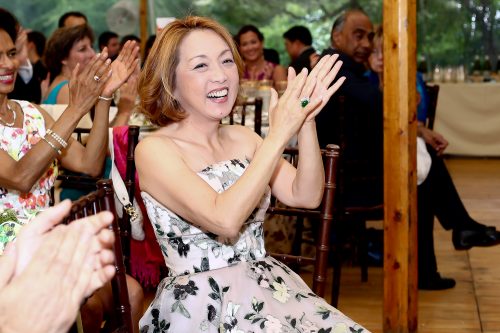
Japanese biochemical engineer Kuno, co-founder and CEO of the S&R Foundation based at Halcyon House, has extended her philanthropic activity by joining forces with Sheila Johnson, owner of Salamander Hotels and Resorts, to start WE Capital, a female-led investment fund aimed at supporting tech-driven businesses headed by women. Japanese-born Kuno, who according to Forbes magazine is worth $330 million, is also a member of the board of directors of Johns Hopkins Medicine and supports other causes including the National Museum of Women in the Arts, the Middleburg Film Festival and the Washington Ballet.
TED and LYNN LEONSIS
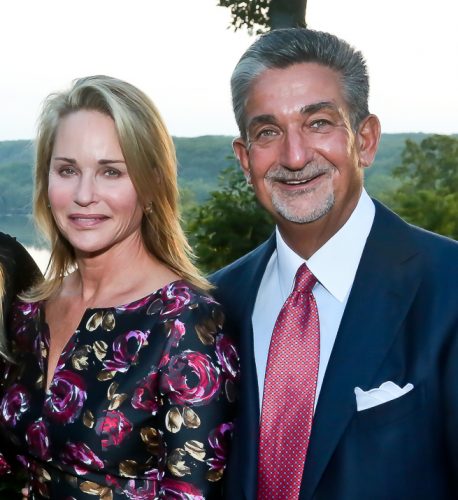 Sports have been hit hard by the coronavirus pandemic and this means challenges for Washington’s Monumental Sports & Entertainment, the sprawling $2.5 billion complex of which Leonsis is founder and chief executive. With its seven professional sports teams (including the NHL’s Washington Capitals, the NBA’s Wizards, and the WNBA’s Mystics) at a standstill, and its Capital One arena in lockdown, the company, one of the capital’s highest profile enterprises, stepped up to the plate. All part-time staff at the shutdown Arena—roughly 500 people—were paid through March 31. “When we made the announcement to stop all NHL games, NBA games, all concerts, we had to have great levels of empathy for those people,” Leonsis said. Monumental also teamed up with two small businesses that normally cater food for the Capitals and Wizards to form Feeding the Frontlines, which provides meals for hospital workers and first responders in the DMV. Meanwhile, Ted and his wife Lynn Leonsis continued their own philanthropy through their family foundation focusing on children’s education and mentoring in the broader Washington community. Ted is also co-founder, with AOL founder Steve Case of Revolution, which underwrites start-ups with fresh business ideas.
Sports have been hit hard by the coronavirus pandemic and this means challenges for Washington’s Monumental Sports & Entertainment, the sprawling $2.5 billion complex of which Leonsis is founder and chief executive. With its seven professional sports teams (including the NHL’s Washington Capitals, the NBA’s Wizards, and the WNBA’s Mystics) at a standstill, and its Capital One arena in lockdown, the company, one of the capital’s highest profile enterprises, stepped up to the plate. All part-time staff at the shutdown Arena—roughly 500 people—were paid through March 31. “When we made the announcement to stop all NHL games, NBA games, all concerts, we had to have great levels of empathy for those people,” Leonsis said. Monumental also teamed up with two small businesses that normally cater food for the Capitals and Wizards to form Feeding the Frontlines, which provides meals for hospital workers and first responders in the DMV. Meanwhile, Ted and his wife Lynn Leonsis continued their own philanthropy through their family foundation focusing on children’s education and mentoring in the broader Washington community. Ted is also co-founder, with AOL founder Steve Case of Revolution, which underwrites start-ups with fresh business ideas.
TED and ANNETTE LERNER
 The Washington Post once said there was “no greater homegrown real estate executive” in D.C. than Ted Lerner, developer of Tysons Corner Center and other areas, and went on to describe him as litigious by listing some of his more notable court cases. Since 2006, he has owned the World Series titleholders, the Washington Nationals baseball team. Mark Lerner, Ted’s son and managing principal owner of the Nationals told staff they would continue to receive full pay until May 31. When COVID-19 stopped playing at Nats stadium, the Lerners gave permission for it be used by José Andrés’ World Central Kitchen to feed the needy. The Annette and Theodore Lerner Foundation has contributed to the Children’s Hospital Foundation, Friends of Cancer Research (Ted is a cancer survivor), Charles E. Smith Jewish Day School and Hebrew University of Jerusalem. Recently, the foundation gifted $5 million to underwrite George Washington University’s new fitness and recreation building.
The Washington Post once said there was “no greater homegrown real estate executive” in D.C. than Ted Lerner, developer of Tysons Corner Center and other areas, and went on to describe him as litigious by listing some of his more notable court cases. Since 2006, he has owned the World Series titleholders, the Washington Nationals baseball team. Mark Lerner, Ted’s son and managing principal owner of the Nationals told staff they would continue to receive full pay until May 31. When COVID-19 stopped playing at Nats stadium, the Lerners gave permission for it be used by José Andrés’ World Central Kitchen to feed the needy. The Annette and Theodore Lerner Foundation has contributed to the Children’s Hospital Foundation, Friends of Cancer Research (Ted is a cancer survivor), Charles E. Smith Jewish Day School and Hebrew University of Jerusalem. Recently, the foundation gifted $5 million to underwrite George Washington University’s new fitness and recreation building.
EVE AUCHINCLOSS LILLEY
 One of the Washington Ballet’s longest and most generous trustees and its vice-chairwoman, Eve Auchincloss Lilley recently made a $200,000 challenge grant to help tide the company over during its enforced closure. A granddaughter of a Dillon Read partner married to William Lilley III, a Philadelphia banking heir and former government official, the Lilleys personify discreet philanthropy in the causes they support. These include the Maryland Youth Ballet, the Lab School (Eve Lilley is a learning disabilities specialist), the Parkinson’s Disease Foundation, the Wendt Center for Loss and Healing, the Theater Lab and St. Timothy’s School.
One of the Washington Ballet’s longest and most generous trustees and its vice-chairwoman, Eve Auchincloss Lilley recently made a $200,000 challenge grant to help tide the company over during its enforced closure. A granddaughter of a Dillon Read partner married to William Lilley III, a Philadelphia banking heir and former government official, the Lilleys personify discreet philanthropy in the causes they support. These include the Maryland Youth Ballet, the Lab School (Eve Lilley is a learning disabilities specialist), the Parkinson’s Disease Foundation, the Wendt Center for Loss and Healing, the Theater Lab and St. Timothy’s School.
LAURA EVANS and MIKE MANATOS
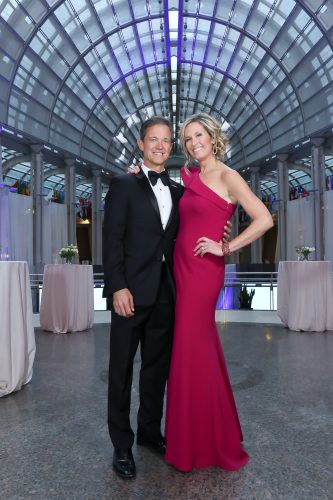 Washington lobbyist Mike Manatos is an active supporter of Greek and Orthodox causes in the U.S., reflecting his own Greek origins. He is a prominent supporter of the National Hellenic Society, Leadership 100, National Hellenic Students Association, among others. Every year, his lobby firm contributes between $1 million and $1.5 million in pro bono work, mainly for Greek-American causes. Laura, a former television journalist, supports several local charities and chairs benefit galas, including The Leukemia Lymphoma Society’s annual Light the Night Walks, the Leukemia Ball, Lazarex Cancer Foundation and more. She also helps lead the DC Newswomen: a collaboration of more than 20 women in DC broadcast news who raise money for various local breast cancer charities. As board chair for the Make-A-Wish Foundation’s Mid-Atlantic region, Mike, with the help of his wife, have personally raised over $1.5 million for local wish kids.
Washington lobbyist Mike Manatos is an active supporter of Greek and Orthodox causes in the U.S., reflecting his own Greek origins. He is a prominent supporter of the National Hellenic Society, Leadership 100, National Hellenic Students Association, among others. Every year, his lobby firm contributes between $1 million and $1.5 million in pro bono work, mainly for Greek-American causes. Laura, a former television journalist, supports several local charities and chairs benefit galas, including The Leukemia Lymphoma Society’s annual Light the Night Walks, the Leukemia Ball, Lazarex Cancer Foundation and more. She also helps lead the DC Newswomen: a collaboration of more than 20 women in DC broadcast news who raise money for various local breast cancer charities. As board chair for the Make-A-Wish Foundation’s Mid-Atlantic region, Mike, with the help of his wife, have personally raised over $1.5 million for local wish kids.
JACQUELINE BADGER MARS
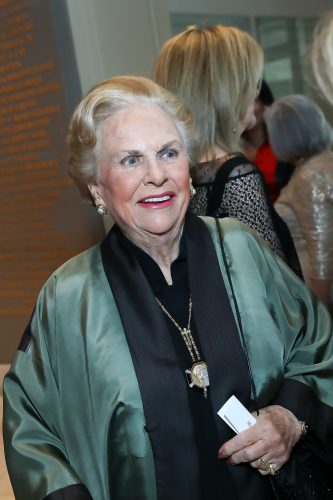
Mars Incorporated, owned and run by Jacqueline Mars and other members of her family, has launched a worldwide response to the COVID-19 pandemic in the shape of what the company calls “an initial cash and in-kind donation” of $20 million to help affected people—and pets. In addition, the Mars Family has made separate gifts to local aid organizations, including $500,000 to the Capital Area Food Bank. The major commitment, announced in April, includes a $5 million donation to CARE to help women, children and refugee populations in the developing world, $2 million to the U.S. World Food Program as it responds to the pandemic and $12 million to provide help through its handful of foundations in the markets where the McLean-headquartered corporation operates. The Humane Society International received a $1 million gift to cope with the overcrowding in its shelters as sick and impoverished owners abandon their pets. The Mars aid package is described as “initial,” which suggests that more support could be forthcoming as the situation warrants. In pandemic-free times, Jacqueline Mars’ philanthropy focuses on causes that reflect her longtime passions—the Kennedy Center, the Washington National Opera, the National Archives and the National Sporting Library and Museum in Middleburg, Va., where she is the main patron and vice-chair.
VIRGINIA CRETELLA MARS
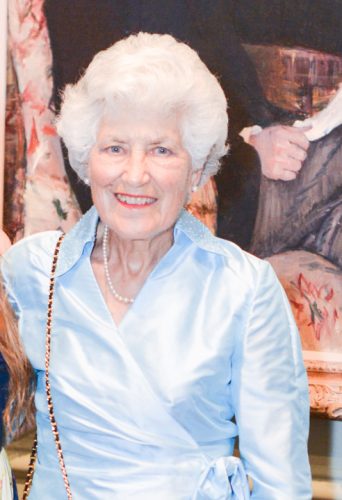
Late this year, COVID-19 permitting, Washington National Cathedral expects to inaugurate its new $22 million Virginia Mae Center, an educational center offering conferences and courses in music, religious, social and cultural subjects. To create the center —called College of Faith and Culture, an old neo-Gothic structure on the cathedral grounds was gutted and restored to include meeting spaces and bedrooms for overnight conferences. It is named after Virginia Mae Cretella Mars (divorced former wife of the late candy heir Forrest Mars Jr.), a long-time cathedral benefactor who, with her two daughters, gifted $17 million towards its creation. Mars has supported the cathedral with sizable donations for many years and is secretary of the Cathedral Chapter, its governing board. Through her Virginia Cretella Mars Foundation she also supports the National Gallery of Art, the National Symphony Orchestra (she is a former president), the Smithsonian Institution and Vassar College, her alma mater. At Foxcroft School, a private girl’s school in Middleburg, Va., Mars, who is passionate about the environment, underwrote the installation of geothermal wells to heat and cool the school buildings.
GARY and CHRISTINA CO MATHER
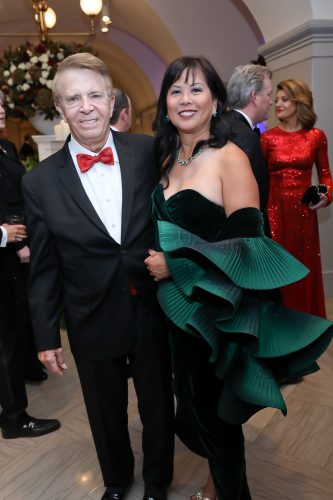
When Gary Mather, Booz Allen Hamilton senior partner emeritus, was battling cancer early in 2019, he recalled recently, “I had to travel to Baltimore, which was a burden,” for the proton treatment he needed. Cancer patients will soon be spared that trip thanks to the Mathers’ $20 million contribution to the Inova Schar Cancer Institute for a Proton Center, which will bear his name. The Mathers also give to a range of other health and musical causes. They are prominent supporters of Washington Performing Arts (Christina Co Mather is co-vice chair) and also underwrite education programs at the Kennedy Center. They are sponsors of SafeSpot Children’s Advocacy Center in Fairfax County, which treats abused children, and of PRS (Psychiatric Rehabilitation Services), a suicide prevention non-profit group.
ALAN and AMY MELTZER
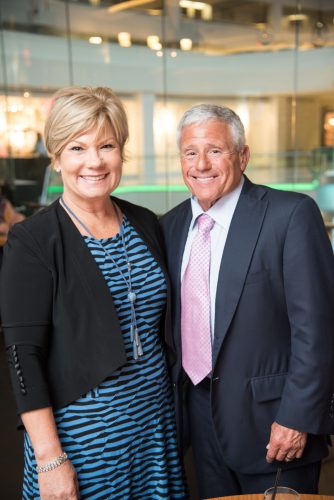 Longtime supporters of American University, which Alan attended on a wrestling scholarship, the Meltzers in late 2019 gifted $5 million for a planned AU Center for Athletic Performance, and a further $2 million endowment to create a Meltzer fellowship at the university’s well-known Center for Israel Studies. Meltzer founded and still heads The Meltzer Group insurance agency. The couple are high-end donors through their Alan and Amy Meltzer Family Foundation, and also through the Meltzer Group Employee Giving Fund, which makes annual donations matched by management. “If I could die with one penny in my checking account and give everything away to both my philanthropic ventures and my children, I’d be a happy guy,” he recently told an interviewer. The search for a cure for diabetes is high on the Meltzer’s philanthropy list, in large part because one of their sons has been a diabetic since boyhood. It’s estimated that they have contributed about $7 million to diabetes research at the Juvenile Diabetes Research Foundation (JDRF) and elsewhere. The Meltzer Foundation has also contributed to Sibley Memorial Hospital, the Hebrew Home of Greater Washington, Food & Friends and other local causes.
Longtime supporters of American University, which Alan attended on a wrestling scholarship, the Meltzers in late 2019 gifted $5 million for a planned AU Center for Athletic Performance, and a further $2 million endowment to create a Meltzer fellowship at the university’s well-known Center for Israel Studies. Meltzer founded and still heads The Meltzer Group insurance agency. The couple are high-end donors through their Alan and Amy Meltzer Family Foundation, and also through the Meltzer Group Employee Giving Fund, which makes annual donations matched by management. “If I could die with one penny in my checking account and give everything away to both my philanthropic ventures and my children, I’d be a happy guy,” he recently told an interviewer. The search for a cure for diabetes is high on the Meltzer’s philanthropy list, in large part because one of their sons has been a diabetic since boyhood. It’s estimated that they have contributed about $7 million to diabetes research at the Juvenile Diabetes Research Foundation (JDRF) and elsewhere. The Meltzer Foundation has also contributed to Sibley Memorial Hospital, the Hebrew Home of Greater Washington, Food & Friends and other local causes.
VADIM NIKITINE and KRISTIN EHRGOOD
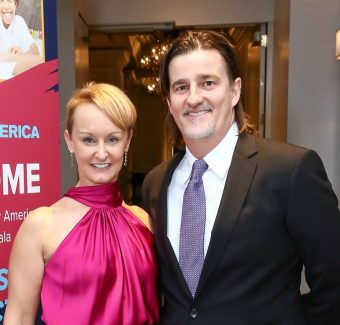 A Washington philanthropic couple teamed up with Lin-Manuel Miranda, composer and star of “Hamilton,” to provide $1 million in emergency relief to support artists and arts organizations in Puerto Rico. Vadim Nikitine is president of CCM Group, a holding company with assets in the commercial and the clean energy sectors. The Mellon Foundation also contributed to the fund, which according to Miranda, “will provide much-needed help for the arts and culture sector, which is suffering from a dramatic loss of income due to canceled events, closures of venues and inability to sell goods and services.” In less strenuous times, the couple’s Flamboyan Foundation strives to improve conditions, and consequently the level of performance, in the District’s public schools.
A Washington philanthropic couple teamed up with Lin-Manuel Miranda, composer and star of “Hamilton,” to provide $1 million in emergency relief to support artists and arts organizations in Puerto Rico. Vadim Nikitine is president of CCM Group, a holding company with assets in the commercial and the clean energy sectors. The Mellon Foundation also contributed to the fund, which according to Miranda, “will provide much-needed help for the arts and culture sector, which is suffering from a dramatic loss of income due to canceled events, closures of venues and inability to sell goods and services.” In less strenuous times, the couple’s Flamboyan Foundation strives to improve conditions, and consequently the level of performance, in the District’s public schools.
RONALD and JOY PAUL
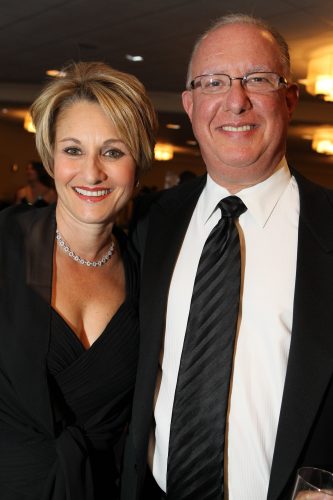 A banker’s two successive kidney transplants 17 years apart led to the gift of $2.5 million to establish a kidney center at George Washington University School of Medicine. The banker is Ronald Paul, who until his retirement in 2019, was chairman and CEO of EagleBank of Bethesda. The Ronald and Joy Paul Foundation made the contribution in 2015 and the center went into operation a year later. But the Pauls’ philanthropy spreads wider to include George Mason University, the University of Maryland College Park Foundation, the Trust for the National Mall (most recent gift $25,000) and the Jewish Federation of Greater Washington. Joy Paul, a social worker in private practice, is vice- president of Everymind (formerly the Mental Health Association, Montgomery County), a mental health resource that Eagle Bank supports. She also heads the Washington Center for Women’s and Children’s Wellness. This year’s 5K Run for EveryMind, sponsored, in part, by the Pauls, was canceled because of the COVID-19 crisis.
A banker’s two successive kidney transplants 17 years apart led to the gift of $2.5 million to establish a kidney center at George Washington University School of Medicine. The banker is Ronald Paul, who until his retirement in 2019, was chairman and CEO of EagleBank of Bethesda. The Ronald and Joy Paul Foundation made the contribution in 2015 and the center went into operation a year later. But the Pauls’ philanthropy spreads wider to include George Mason University, the University of Maryland College Park Foundation, the Trust for the National Mall (most recent gift $25,000) and the Jewish Federation of Greater Washington. Joy Paul, a social worker in private practice, is vice- president of Everymind (formerly the Mental Health Association, Montgomery County), a mental health resource that Eagle Bank supports. She also heads the Washington Center for Women’s and Children’s Wellness. This year’s 5K Run for EveryMind, sponsored, in part, by the Pauls, was canceled because of the COVID-19 crisis.
MILTON, CAROLYN and LAUREN PETERSON
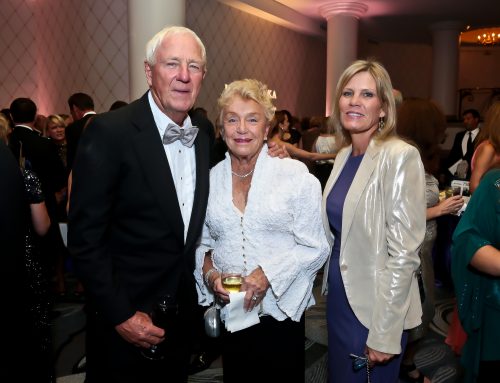 In 1997, Milton Peterson, chairman of the Peterson Companies, developers of National Harbor and a dozen other DMV landmarks, founded the Peterson Family Foundation with his wife Carolyn and their children. Since that time they have helped raise millions of dollars annually. The foundation gifted $10 million towards the Inova Loudoun Hospital and the creation of the Peterson Family Breast Center. More recently, George Mason University inaugurated the Peterson Family Health Sciences Hall. The family also funded the university’s College of Visual Performing Arts. Its wide-ranging philanthropy also includes support for the Northern Virginia Family Service, Gleaning for the World, Teach for America and The United Methodist Church.
In 1997, Milton Peterson, chairman of the Peterson Companies, developers of National Harbor and a dozen other DMV landmarks, founded the Peterson Family Foundation with his wife Carolyn and their children. Since that time they have helped raise millions of dollars annually. The foundation gifted $10 million towards the Inova Loudoun Hospital and the creation of the Peterson Family Breast Center. More recently, George Mason University inaugurated the Peterson Family Health Sciences Hall. The family also funded the university’s College of Visual Performing Arts. Its wide-ranging philanthropy also includes support for the Northern Virginia Family Service, Gleaning for the World, Teach for America and The United Methodist Church.
CATHERINE and WAYNE REYNOLDS
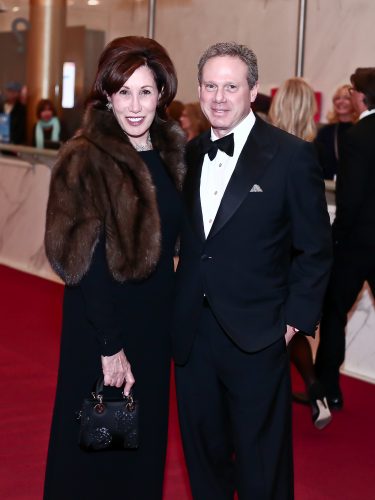 Through her foundation, Catherine Reynolds, who launched and subsequently sold a private student loan business, has made often sizeable contributions to more than 50 charities and institutions, ranging from the Kennedy Center to The Wheelchair Foundation. The Catherine Reynolds Foundation also backs a podcast called “What It Takes,” where visionaries from many fields are interviewed (currently scientists searching for a coronavirus vaccine). Husband Wayne Reynolds chairs the American Academy of Achievement. His proposal to build a Global Forum for Freedom and Justice, a $40 million project in Birmingham, Ala., in the city’s historic civil rights district, have met with pushback from local groups concerned that the new institution would overshadow civil rights landmarks nearby. But the couple are not new to controversy with regard to their giving. In 2002, Catherine withdrew most of a $38 million gift to the Smithsonian Institution following differences over how the museum could use the money. At the time, the Washington Post described the Reynolds as the city’s “newest philanthropic players.” In 2013, the Reynolds were no longer newcomers to philanthropy when Wayne launched an ultimately unsuccessful takeover bid of the financially ailing Corcoran Gallery of Art.
Through her foundation, Catherine Reynolds, who launched and subsequently sold a private student loan business, has made often sizeable contributions to more than 50 charities and institutions, ranging from the Kennedy Center to The Wheelchair Foundation. The Catherine Reynolds Foundation also backs a podcast called “What It Takes,” where visionaries from many fields are interviewed (currently scientists searching for a coronavirus vaccine). Husband Wayne Reynolds chairs the American Academy of Achievement. His proposal to build a Global Forum for Freedom and Justice, a $40 million project in Birmingham, Ala., in the city’s historic civil rights district, have met with pushback from local groups concerned that the new institution would overshadow civil rights landmarks nearby. But the couple are not new to controversy with regard to their giving. In 2002, Catherine withdrew most of a $38 million gift to the Smithsonian Institution following differences over how the museum could use the money. At the time, the Washington Post described the Reynolds as the city’s “newest philanthropic players.” In 2013, the Reynolds were no longer newcomers to philanthropy when Wayne launched an ultimately unsuccessful takeover bid of the financially ailing Corcoran Gallery of Art.
SHARON PERCY ROCKEFELLER
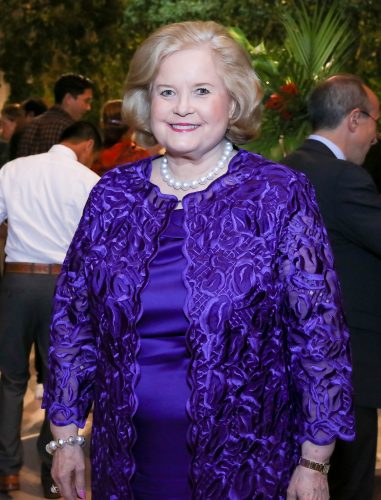 Rockefeller has spent a lifetime in public broadcasting, mostly at the head of WETA, Washington’s local public radio and television, where she has been president and CEO since 1989. WETA, which can be quirky in its programming, broadcasts a respected nightly news program, currently with long-time newscaster Judy Woodruff, and also provides aficionados of British television with regular, if programming. She is also the board chair of the National Gallery of Art, where she and her husband, former West Virginia Sen. John D. “Jay” Rockefeller IV have contributed to the art acquisition program and exhibitions. A well-established figure in Washington, she has also served on the board of Sibley Memorial Hospital, the Phillips Collection, the Smithsonian Associates and the George Washington University.
Rockefeller has spent a lifetime in public broadcasting, mostly at the head of WETA, Washington’s local public radio and television, where she has been president and CEO since 1989. WETA, which can be quirky in its programming, broadcasts a respected nightly news program, currently with long-time newscaster Judy Woodruff, and also provides aficionados of British television with regular, if programming. She is also the board chair of the National Gallery of Art, where she and her husband, former West Virginia Sen. John D. “Jay” Rockefeller IV have contributed to the art acquisition program and exhibitions. A well-established figure in Washington, she has also served on the board of Sibley Memorial Hospital, the Phillips Collection, the Smithsonian Associates and the George Washington University.
DAVID RUBENSTEIN
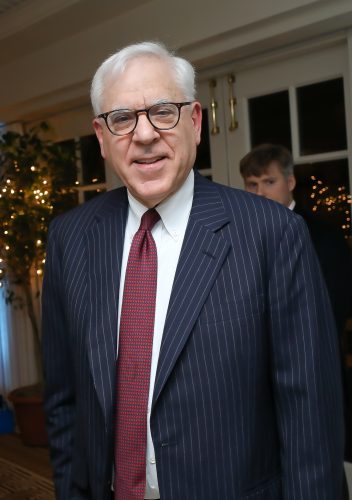 The coronavirus pandemic hasn’t stopped Washington billionaire Rubenstein’s passion— some might say mission—for the preservation of America’s history and priceless historic treasures. In February, he donated $10 million towards a Library of Congress project that he said would “enhance the visitor experience and present the Library’s countless treasures in new and exciting ways.” The Library plans to build a new orientation center and learning lab and to mount exhibitions. The gift is Rubenstein’s latest act of what he has labeled “patriotic philanthropy,” which in large part means filling the void in repair and restoration of Washington’s monuments caused by the passage of time and the neglect of a parsimonious government. Late in 2019, he made another $10 million donation to upgrade the little known museum under the Jefferson Memorial. Meanwhile, his original copy of the Magna Carta, purchased for $21 million, is locked away from public view in its special case in the National Archives because of the COVID-19 lockdown and his equally original stone engraving of the Declaration of Independence in the National Archives, where it is on exhibition. The Atlantic Council website now deems Rubenstein “a private equity pioneer, student of history, master analyst and legendary philanthropist.” Legendary is right: Rubenstein’s engagement with history is only a small part of his total giving, but the one that gains the most public attention.
The coronavirus pandemic hasn’t stopped Washington billionaire Rubenstein’s passion— some might say mission—for the preservation of America’s history and priceless historic treasures. In February, he donated $10 million towards a Library of Congress project that he said would “enhance the visitor experience and present the Library’s countless treasures in new and exciting ways.” The Library plans to build a new orientation center and learning lab and to mount exhibitions. The gift is Rubenstein’s latest act of what he has labeled “patriotic philanthropy,” which in large part means filling the void in repair and restoration of Washington’s monuments caused by the passage of time and the neglect of a parsimonious government. Late in 2019, he made another $10 million donation to upgrade the little known museum under the Jefferson Memorial. Meanwhile, his original copy of the Magna Carta, purchased for $21 million, is locked away from public view in its special case in the National Archives because of the COVID-19 lockdown and his equally original stone engraving of the Declaration of Independence in the National Archives, where it is on exhibition. The Atlantic Council website now deems Rubenstein “a private equity pioneer, student of history, master analyst and legendary philanthropist.” Legendary is right: Rubenstein’s engagement with history is only a small part of his total giving, but the one that gains the most public attention.
FRANK M. SANDS SR.
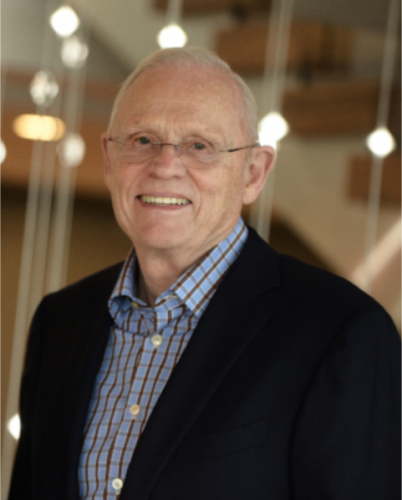 There are gifts, and then there are transformational gifts, such as the $68 million given to the University of Virginia’s Darden School of Business by alumnus Frank M. Sands Sr., founder of Sands Capital Management. The contribution follows an earlier joint donation he made with his son Frank Sands Jr., who himself earned an M.B.A. from Darden in 1994. The Sands’ gift will create the new Sands Institute for Lifelong Learning, supporting 12 new professorships and building world-class facilities that include a new U. Va. Inn at Darden and a Conference Center for Lifelong Learning in Charlottesville, Va. Together with university matching funds, the Sands gift delivers $82 million in total impact. “The Darden School was a transformational experience for me,” Sands said in making the donation.
There are gifts, and then there are transformational gifts, such as the $68 million given to the University of Virginia’s Darden School of Business by alumnus Frank M. Sands Sr., founder of Sands Capital Management. The contribution follows an earlier joint donation he made with his son Frank Sands Jr., who himself earned an M.B.A. from Darden in 1994. The Sands’ gift will create the new Sands Institute for Lifelong Learning, supporting 12 new professorships and building world-class facilities that include a new U. Va. Inn at Darden and a Conference Center for Lifelong Learning in Charlottesville, Va. Together with university matching funds, the Sands gift delivers $82 million in total impact. “The Darden School was a transformational experience for me,” Sands said in making the donation.
ROGER SANT and ALEXIS SANT
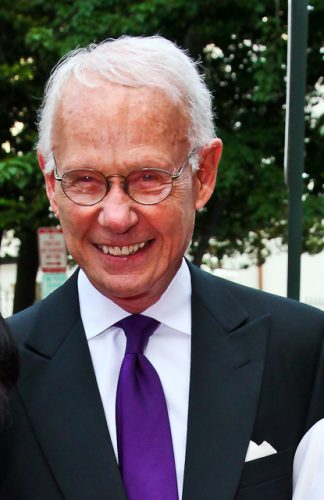 Among the local philanthropists engaged in the fight against the coronavirus pandemic is Roger Sant, chairman of the Summit Foundation, which he co-founded in 1991, and also regent emeritus of the Smithsonian Institution and trustee of the National Symphony Orchestra. Responding “to special needs,” as he puts it, the Summit Foundation contributed to a support fund for laid off staff at the Kennedy Center for the Performing Arts and made gifts to José Andrés’ World Central Kitchen and the Capital Area Food Bank. According to Sant, the Summit Foundation, of which his son Alexis (Lex) is now president, has also given grant recipients “more flexibility in using the funding we’ve committed.” But for Sant, Washington’s lockdown also gets personal: the very popular Sant Ocean Hall funded by his family foundation to the tune of $15 million in the Smithsonian Museum of Natural History is closed for the duration. Ordinarily, the Hall draws millions of visitors every year.
Among the local philanthropists engaged in the fight against the coronavirus pandemic is Roger Sant, chairman of the Summit Foundation, which he co-founded in 1991, and also regent emeritus of the Smithsonian Institution and trustee of the National Symphony Orchestra. Responding “to special needs,” as he puts it, the Summit Foundation contributed to a support fund for laid off staff at the Kennedy Center for the Performing Arts and made gifts to José Andrés’ World Central Kitchen and the Capital Area Food Bank. According to Sant, the Summit Foundation, of which his son Alexis (Lex) is now president, has also given grant recipients “more flexibility in using the funding we’ve committed.” But for Sant, Washington’s lockdown also gets personal: the very popular Sant Ocean Hall funded by his family foundation to the tune of $15 million in the Smithsonian Museum of Natural History is closed for the duration. Ordinarily, the Hall draws millions of visitors every year.
DWIGHT and MARTHA SCHAR
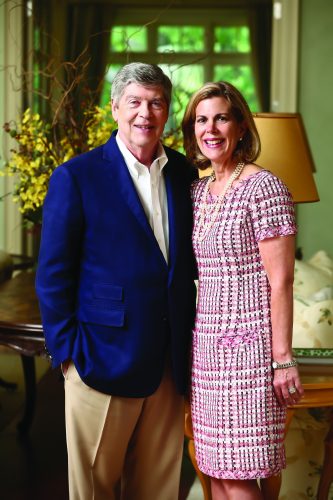 The Schars gifted $50 million to the Inova Health System to bankroll a cancer care and research institute that now bears their name. Other funds have gone to George Mason University, including $10 million to its School of Policy, Government and International Affairs. Dwight Schar is also a benefactor of Ashland University, in Ashland, Ohio, his alma mater, where the college of nursing, the education college and the athletic complex are all part of a $12 million gift (and carry his name) and Elon University, where the Schars have contributed to a school of communications and other projects.
The Schars gifted $50 million to the Inova Health System to bankroll a cancer care and research institute that now bears their name. Other funds have gone to George Mason University, including $10 million to its School of Policy, Government and International Affairs. Dwight Schar is also a benefactor of Ashland University, in Ashland, Ohio, his alma mater, where the college of nursing, the education college and the athletic complex are all part of a $12 million gift (and carry his name) and Elon University, where the Schars have contributed to a school of communications and other projects.
FRED and KAREN SCHAUFELD
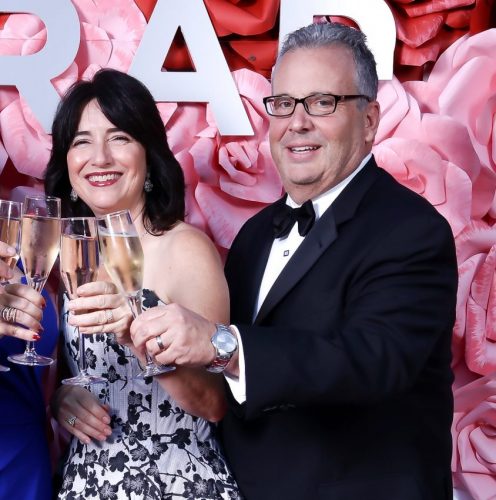 The Schaufelds are both entrepreneurs and philanthropists, mostly active in Loudoun County, Va., where they live. Attorney Karen Schaufeld founded 100WomenStrong, a group that invests in organizations and programs designed to improve the quality of life in Loudoun County. An author of children’s books, she co-founded All Ages Read Together to give pre-K children from low-income families a head start in literacy. Karen Schaufeld is also a member of the WECapital initiative, which invests in businesses run by women. Fred Schaufeld is founder and managing director of the private equity firm SWaN & Legend and an ownership partner of Monumental Sports & Entertainment, owners of the Washington Capitals, the Mystics and Wizards pro sports teams. The couple have donated a scholarship fund at Lehigh University, their alma mater, and support the university in a number of other initiatives.
The Schaufelds are both entrepreneurs and philanthropists, mostly active in Loudoun County, Va., where they live. Attorney Karen Schaufeld founded 100WomenStrong, a group that invests in organizations and programs designed to improve the quality of life in Loudoun County. An author of children’s books, she co-founded All Ages Read Together to give pre-K children from low-income families a head start in literacy. Karen Schaufeld is also a member of the WECapital initiative, which invests in businesses run by women. Fred Schaufeld is founder and managing director of the private equity firm SWaN & Legend and an ownership partner of Monumental Sports & Entertainment, owners of the Washington Capitals, the Mystics and Wizards pro sports teams. The couple have donated a scholarship fund at Lehigh University, their alma mater, and support the university in a number of other initiatives.
RAJIV SHAH
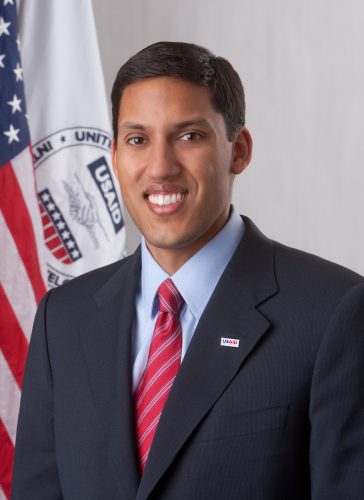 The president of the Rockefeller Foundation was President Barack Obama’s administrator of USAID. Early in the pandemic outbreak the multi-million-dollar humanitarian foundation he runs went into code red and began identifying priorities for support and assistance. He is critical of the Trump administration’s problems in coming to grips with the crisis, but says the fault has deeper roots. In his annual letter as foundation president, issued as the scourge of the coronavirus began to be felt in the U.S. he said: “We’ve known for years that nearly half of American families are deeply vulnerable to any health and economic crisis, and yet we have not embraced the practical bipartisan policies that would have supported the very people—disproportionately poor and people of color—who are now at greatest risk.” The Rockefeller Foundation is investing $50 million in an action plan designed to accelerate the number of tests and improve their efficacy in tracking the spread of COVID-19. Part one of the strategy is to set up in each state a more efficient system of increasing test capacity at national and local labs. For stage two, the foundation has begun hiring up to 300,000 people to create what Shah calls “a community health corps as boots-on-the-ground to carry out diagnostic testing for COVID-19 here in the U.S.” and to do contact tracing of those who have come into contact with infected individuals. Shah says the foundation’s set-up to go from the current one million tests weekly in the U.S. to three million in eight weeks and to 30 million within six months. “Without testing, you really don’t have data on who’s positive. And when you don’t have data, you can’t drive a data driven pandemic
The president of the Rockefeller Foundation was President Barack Obama’s administrator of USAID. Early in the pandemic outbreak the multi-million-dollar humanitarian foundation he runs went into code red and began identifying priorities for support and assistance. He is critical of the Trump administration’s problems in coming to grips with the crisis, but says the fault has deeper roots. In his annual letter as foundation president, issued as the scourge of the coronavirus began to be felt in the U.S. he said: “We’ve known for years that nearly half of American families are deeply vulnerable to any health and economic crisis, and yet we have not embraced the practical bipartisan policies that would have supported the very people—disproportionately poor and people of color—who are now at greatest risk.” The Rockefeller Foundation is investing $50 million in an action plan designed to accelerate the number of tests and improve their efficacy in tracking the spread of COVID-19. Part one of the strategy is to set up in each state a more efficient system of increasing test capacity at national and local labs. For stage two, the foundation has begun hiring up to 300,000 people to create what Shah calls “a community health corps as boots-on-the-ground to carry out diagnostic testing for COVID-19 here in the U.S.” and to do contact tracing of those who have come into contact with infected individuals. Shah says the foundation’s set-up to go from the current one million tests weekly in the U.S. to three million in eight weeks and to 30 million within six months. “Without testing, you really don’t have data on who’s positive. And when you don’t have data, you can’t drive a data driven pandemic
response,” Shah says.
GABRIELA SMITH
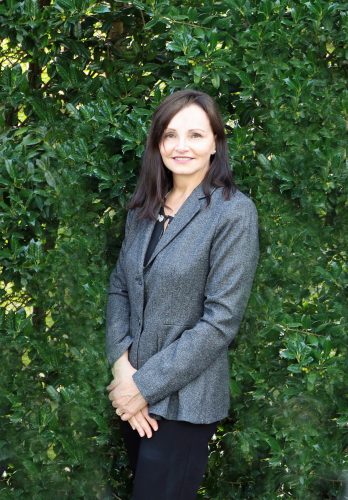 Education, Gabriela Smith believes, is the pathway toward racial and economic justice. Smith created the Crimsonbridge Foundation to focus on education, leadership development, and non-profit capacity building, with a particular lens towards serving the Hispanic community in a tribute to Smith’s own formation and heritage. “It was thanks to scholarships that I was able to advance my education,” she says. Hispanics are expected to account for 30 percent of the U.S. population by 2060. “These will be our future service providers and career professionals, our future leaders, scientists and inventors, and this is the generation that we need to help educate now,” she added. Smith is proud of the impact she and her team have already demonstrated in the foundation’s short five year history. An anonymous donor for many years, Smith was a founding investor in Venture Philanthropy Partners (VPP), the organization that utilizes a business approach to giving. As she put it in a recent interview, “VPP helped develop best practices for investing in the social sector, and, with this, the importance of outcome measurements and results.” Smith is also a former member of Georgetown University’s board of regents and of the Harvard Kennedy School’s dean’s council, her alma mater.
Education, Gabriela Smith believes, is the pathway toward racial and economic justice. Smith created the Crimsonbridge Foundation to focus on education, leadership development, and non-profit capacity building, with a particular lens towards serving the Hispanic community in a tribute to Smith’s own formation and heritage. “It was thanks to scholarships that I was able to advance my education,” she says. Hispanics are expected to account for 30 percent of the U.S. population by 2060. “These will be our future service providers and career professionals, our future leaders, scientists and inventors, and this is the generation that we need to help educate now,” she added. Smith is proud of the impact she and her team have already demonstrated in the foundation’s short five year history. An anonymous donor for many years, Smith was a founding investor in Venture Philanthropy Partners (VPP), the organization that utilizes a business approach to giving. As she put it in a recent interview, “VPP helped develop best practices for investing in the social sector, and, with this, the importance of outcome measurements and results.” Smith is also a former member of Georgetown University’s board of regents and of the Harvard Kennedy School’s dean’s council, her alma mater.
DIANA DAVIS SPENCER and ABBY SPENCER MOFFETT
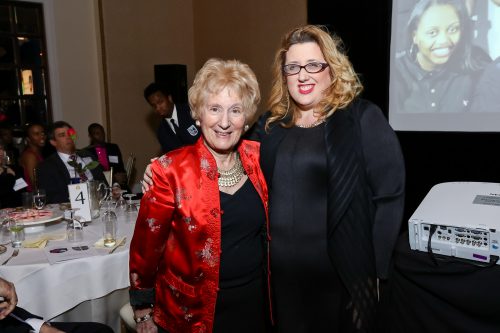 A daughter of Shelby Cullom Davis, the late investment magnate and U.S. diplomat, Diana Davis Spencer distributes grants through her eponymous foundation to a variety of organizations espousing national security, entrepreneurship, free enterprise, the arts, education, health care and the environment. Recent grants have included $100,000 to the National Museum of the U.S. Army, $430,000 to the Center for Security Policy and $250,000 to the Investigative Project on Terrorism plus other grants to the International Student House and PEN/Faulkner Foundation. Her daughter, Abby Spencer Moffett, serves as the CEO of the Diana Davis Spencer Foundation.
A daughter of Shelby Cullom Davis, the late investment magnate and U.S. diplomat, Diana Davis Spencer distributes grants through her eponymous foundation to a variety of organizations espousing national security, entrepreneurship, free enterprise, the arts, education, health care and the environment. Recent grants have included $100,000 to the National Museum of the U.S. Army, $430,000 to the Center for Security Policy and $250,000 to the Investigative Project on Terrorism plus other grants to the International Student House and PEN/Faulkner Foundation. Her daughter, Abby Spencer Moffett, serves as the CEO of the Diana Davis Spencer Foundation.
EARL and AMANDA STAFFORD
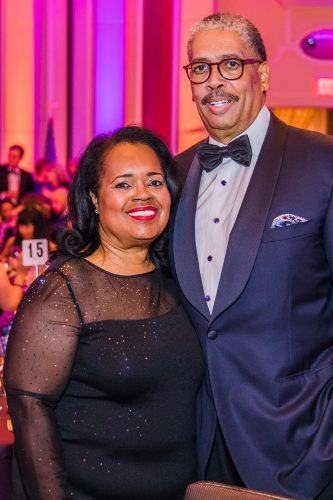 “Giving and doing good is the rent that we pay for the space that we occupy in this country, and we all have to pay some rent.” So said Earl Stafford, whose rent by his own definition was a $2 million donation to the National Museum of African-American History & Culture for the media arts center that carries his name and that of his wife, Amanda. The Stafford Foundation supported the construction of Christian churches in African countries, including Liberia, Tanzania and Zambia. The Staffords have supported education programs for underserved Washington children in conjunction with Most Valuable Kids (MVK) and Monumental Sports & Entertainment, where Earl Stafford is a partner.
“Giving and doing good is the rent that we pay for the space that we occupy in this country, and we all have to pay some rent.” So said Earl Stafford, whose rent by his own definition was a $2 million donation to the National Museum of African-American History & Culture for the media arts center that carries his name and that of his wife, Amanda. The Stafford Foundation supported the construction of Christian churches in African countries, including Liberia, Tanzania and Zambia. The Staffords have supported education programs for underserved Washington children in conjunction with Most Valuable Kids (MVK) and Monumental Sports & Entertainment, where Earl Stafford is a partner.
RYUJI UENO
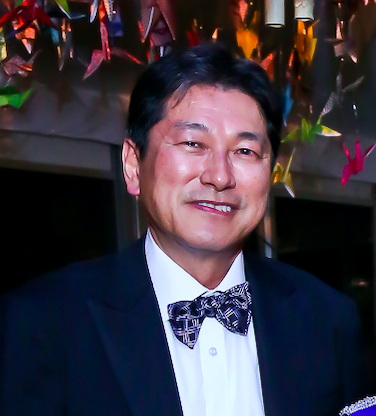
In 2011, Ueno and his wife Sachiko Kuno, both Japanese biochemists, caught public attention when they acquired two of Georgetown’s landmark historic mansions, Evermay and Halcyon House. In the latter house, the couple, who owned Sucampo Pharmaceuticals Inc., set up the S&R Foundation (now Halcyon), a philanthropic incubator project that houses and trains would-be entrepreneurs. The couple divorced in 2016, and two years later Sucampo was sold for $1.2 billion. For the past few years, biochemistry has been replaced in Ueno’s life by classical music, a lifelong passion. His Ryuji Ueno Foundation underwrites the annual Evermay Concert Series of 14 musical events. In March, the Heifetz International Music Institute, a group of young string musicians, was scheduled to give the opening concert of the season at Evermay, but the event was canceled because of the COVID-19 pandemic. The foundation supports a number of individual artists to develop and explore their talent, and is patron of the 6821 Quintet (6,821 is the number of miles between Washington and Tokyo) and The New Orchestra of Washington. Ueno is also a board member of Young Concert Artists and the Shanghai Symphony Orchestra. An accomplished amateur flutist, he coaches pianists, violinists, singers, guitarists, and conductors. He is also a collector of musical instruments (and fast cars), and sponsors the Liechtenstein International Music Academy’s “Washington Semester” program, where he also lectures.
BEAU VAN METRE JR. and ALISON VAN METRE PALEY
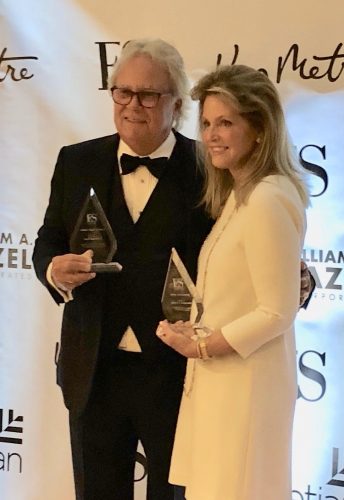 This Fairfax-based residential and commercial real estate family company channels its philanthropy through the Van Metre Companies Foundation and the Van Metre Family Foundation. Alison Van Metre Paley, sister of company chairman and partner, Beau, heads the latter. The two foundations often work in tandem. The Adler Center, a 21-bed hospice in Loudoun County, stands on land donated by the company foundation plus a main gift of $1 million towards its construction from the family. The Van Metre Companies organize a five-mile run every year in aid of the Children’s National Health System. The family foundation supports a long list of causes including the National Gallery of Art, the Washington Ballet and Women Giving Back. In the current COVID-19 crisis, both foundations are giving to Loudoun Hunger Relief, Dulles South Food Pantry and Inova’s Emergency Preparedness Fund.
This Fairfax-based residential and commercial real estate family company channels its philanthropy through the Van Metre Companies Foundation and the Van Metre Family Foundation. Alison Van Metre Paley, sister of company chairman and partner, Beau, heads the latter. The two foundations often work in tandem. The Adler Center, a 21-bed hospice in Loudoun County, stands on land donated by the company foundation plus a main gift of $1 million towards its construction from the family. The Van Metre Companies organize a five-mile run every year in aid of the Children’s National Health System. The family foundation supports a long list of causes including the National Gallery of Art, the Washington Ballet and Women Giving Back. In the current COVID-19 crisis, both foundations are giving to Loudoun Hunger Relief, Dulles South Food Pantry and Inova’s Emergency Preparedness Fund.
SHARON VIRTS and SCOTT MILLER
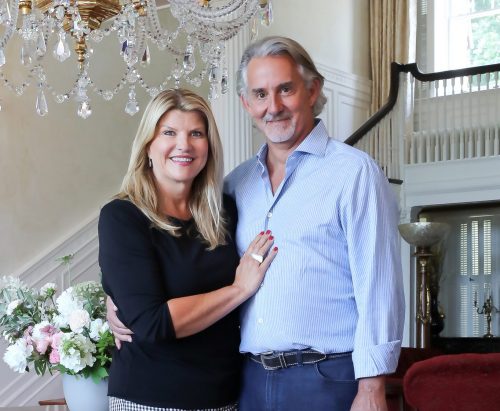
When Sharon Virts launched what was then called the Sharon D. Virts Foundation in 2016, her first donation was a $10,000 check to The Land Trust of Virginia. Last year, the Inova Loudoun Hospital opened its new trauma center for which the now-named Virts Miller Family Foundation had underwritten with $4 million. Virts had in the interim married tech executive Scott Miller. The Virts Miller Family Foundation focuses its philanthropic activity on Loudoun County, Va., where Virts lived and ran FCi Federal Inc., a company she founded providing technical support to Federal immigration programs. The foundation’s emphasis is on education, health, and local culture. Virts, now an author of two historical fiction novels, is also one of the initial investors in WECapital.
MARVIN WEISSBERG
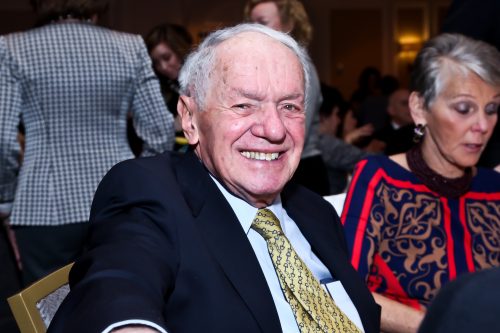 The Weissberg Foundation’s COVID-19 offensive focuses on its core commitment to advancing racial equality. The foundation, established in 1988 by local real estate developer Marvin Weissberg, aims at “building the power of those most negatively impacted by racism.” To combat the pandemic, the Weissberg Foundation has upped its level of support to its long list of regular grantees, among them Empower DC, Justice for Muslims Collective, Many Languages One Voice and has added gifts of $50,000 to the Greater Washington Community COVID-19 Emergency Response and $25,000 to TheatreWashington’s Taking Care fund. In total, the fund has committed to raise $1 million in urgent relief to financially strapped theaters, including the Mosaic Theater Company and the Woolly Mammoth Theatre Company.
The Weissberg Foundation’s COVID-19 offensive focuses on its core commitment to advancing racial equality. The foundation, established in 1988 by local real estate developer Marvin Weissberg, aims at “building the power of those most negatively impacted by racism.” To combat the pandemic, the Weissberg Foundation has upped its level of support to its long list of regular grantees, among them Empower DC, Justice for Muslims Collective, Many Languages One Voice and has added gifts of $50,000 to the Greater Washington Community COVID-19 Emergency Response and $25,000 to TheatreWashington’s Taking Care fund. In total, the fund has committed to raise $1 million in urgent relief to financially strapped theaters, including the Mosaic Theater Company and the Woolly Mammoth Theatre Company.




